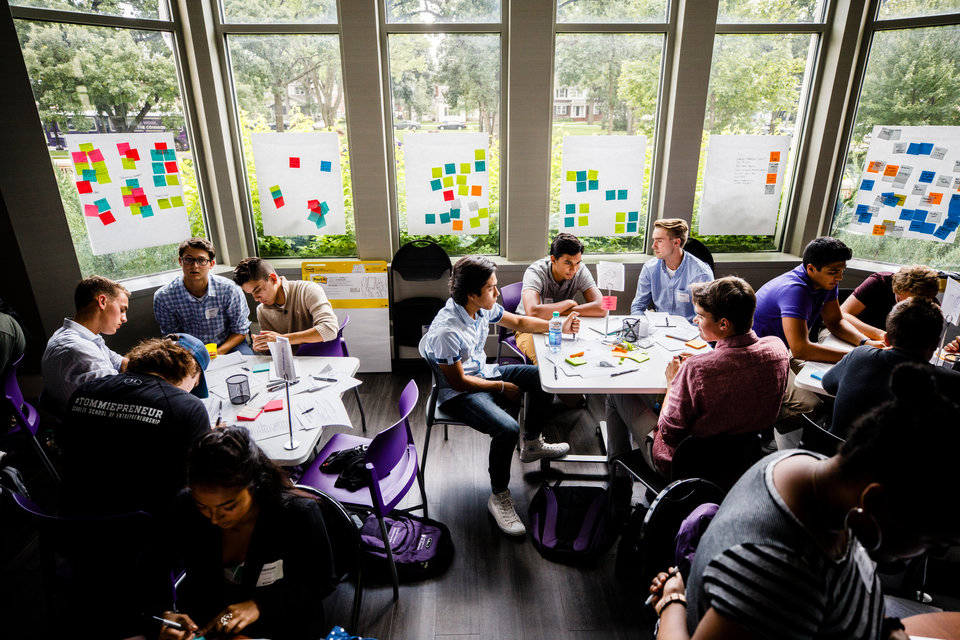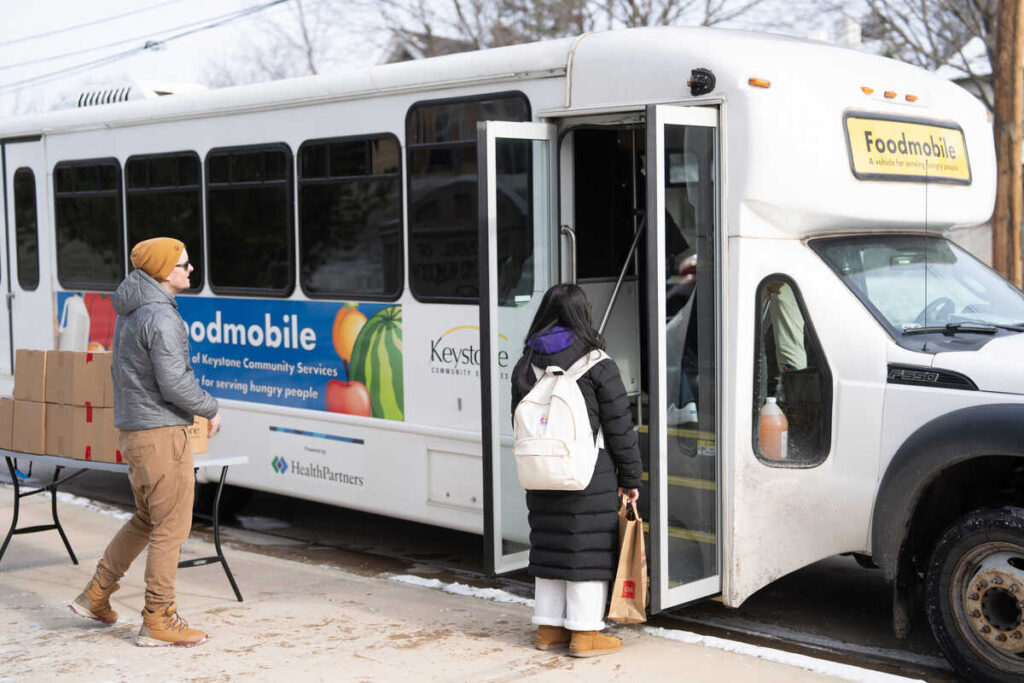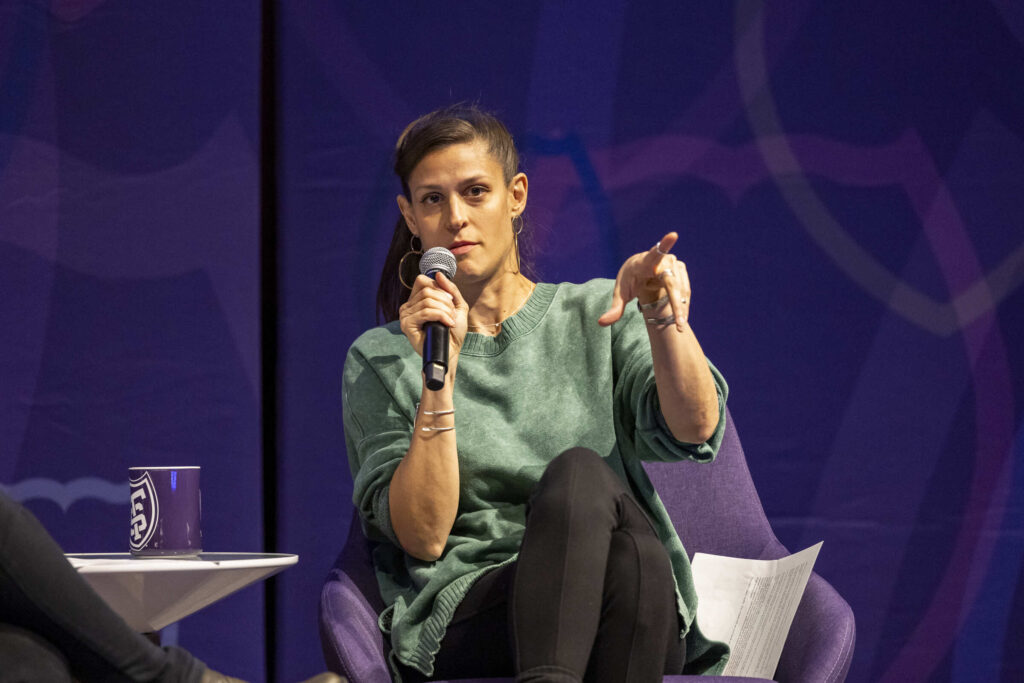Last year, Sarah Nelson ’18 interned at the retail consulting firm JL Buchanan. As part of its consumer insights team, the entrepreneurship major worked on researching and developing a strategy for an essential oil category at a major department store retailer. The information Nelson and her colleagues produced was instrumental when JL Buchanan pitched ideas to the department store.
Nelson's role at JL Buchanan focused on consumer research, aligning much of what she did at the company with what she had learned in a class she had taken on entrepreneurial research and design thinking methodology.
This summer, Nelson worked for Fusion Hill, a research, strategy and creative agency. She was part of a strategy team tasked with conducting research, competitive analyses and value propositions for clients. Once again, Nelson used those entrepreneurial skills to think critically while keeping in mind the client’s position and the needs of the consumer. Nelson credits the skills she developed as a student at the Schulze School of Entrepreneurship with helping her succeed as an intern and preparing her for “life in the real world.”
“As entrepreneurship majors we were able to grow and develop as individuals by running companies from head to toe, understanding investor financials and learning about the consumer's view through design thinking,” Nelson said. “Most notably, I became better equipped to test the viability of a concept or strategy. I learned how to mitigate risk and make wise choices. These skills will definitely help me as I grow and develop as a strategist.”
The value of an entrepreneurial mindset
The entrepreneurial mindset Nelson sharpened at St. Thomas is applicable to any career, said Laura Dunham, PhD, associate dean of the Schulze School of Entrepreneurship. While most people think entrepreneurship is synonymous with business, it is far from the only career choice for majors in the field. In fact, many graduates take an “intrapreneurial” route allowing them the opportunity to bring their own, unique entrepreneurial skills into an established company looking for innovative employees to boost growth. Companies rely on those tools and skills entrepreneurship students and graduates have to spot new opportunities in the marketplace, evaluate them and decide how to pursue them effectively.
“My students who don’t want to start a business will ask, ‘What will I do?’” Dunham said. “I just have to go onto Indeed.com and type in 'entrepreneur' and 600 opportunities show up in the Twin Cities from entry level positions to chief operating officers. You’re seeing the entrepreneurial mindset and entrepreneurial skills more and more as a requirement for jobs across functions in a company. They want people who can deal with unstructured problems, who know how to – despite uncertainty – search opportunities and figure out how to pursue them. Those are entrepreneurial competencies.”
Critical parts of that mindset include curiosity and empathy, along with unique business competencies and creative problem solving skills.
“It’s about sparking your creative confidence – your ability to know you can do stuff,” Dunham said. “It’s about sparking what we we call opportunity orientation. When other people say, ‘This is a drag,’ entrepreneurs say, ‘This is a drag, but what would make it better? Is there a business here? Let me think.’”
Intrapreneurs using entrepreneurial skills
A consultant for Optum, Dylan Condé-Brooks ’17 uses his expert problem-solving skills to tackle issues in the health care industry.
“One of the biggest skills entrepreneurs have is looking at, 'Why has there always been a problem like this and how can we solve it?'” said the entrepreneurship and marketing major.
Instead of just putting a Band-Aid on the complex problems he’s asked to scrutinize, it's up to Condé-Brooks to find creative solutions.
“I’d go to job interviews and they would ask why I majored in entrepreneurship if I didn’t want to start my own business,” Condé-Brooks said. “They didn’t understand why anyone would major in that and want to go work for a company. I told them it was more about problem-solving. You have one class as an entrepreneurship major at St. Thomas where you have to read balance sheets and know what a convertible note is – all of the minutiae, finite details of finance for business. All the other classes I had were about problem-solving, being creative and doing more with less. You can apply that skill set to running your own business or for going into a business and helping it solve its problems.”
Alex French ’11 might be well-known for starting Bizzy Coffee, which is ranked No. 1 on Amazon in the cold brew coffee category and is sold at hundreds of stores across the United States. But prior to launching Bizzy with Andrew Healy, French was an innovator at General Mills.
After graduation, he took a job at a big electronics retailer, where he worked in planning. He couldn't leverage his entrepreneurial skills at that particular company, so he created a snowboarding accessory and began to market the item. This helped him land a job at General Mills, where he flexed his creative muscle as he solved consumer problems.
“As soon as I was at General Mills, everything opened up and I was able to leverage that skill set of mine,” said the entrepreneurship and finance major. “I ended up getting promoted into a role as an intrapreneur where I was working in their start-up division. I was literally running a tech start-up.”
French ended up working on a nontraditional product line for the company, where he exceled thanks to his talent and passion for entrepreneurship and his own personal business experience.
“I became one of the go-to innovators within the company,” he said. “People would bring me into meetings for innovation and they would use me as a sounding board for ideas and consumer insights and learning. It allowed me to be the intrapreneur; I was able to present ideas to leadership and actually get investment behind my ideas. I was able to execute them based on my plan. That’s the perfect world intrapreneurship – it was my definition of starting businesses within a corporation, which was really exciting and fun. You’re basically an entrepreneur with less risk.”
Ultimately, French left General Mills to focus on developing Bizzy. Because of his stellar reputation at the company, French said many of his former colleagues were willing to help him out when he launched his own start-up.
Feeling empowered
Drawn to St. Thomas because of her interest in in the entrepreneurship program, Jenna Breen ’12 knew from a young age she wanted to pursue a career in business after watching her father in his role as vice president of operations at a Fargo company.
While she saw some of her classmates start businesses, Breen discovered she had a passion for implementation rather than generating ideas. She was able to apply what she learned in the entrepreneurship program to further her career both at the health care communications company Spok and currently as a CRM product manager at HelpSystems.
“I realized getting into the business as a product strategy/product manager role, you are basically like an internal entrepreneur – you’re the owner of your own product,” Breen said. “It’s very entrepreneurial in that regard.”
While starting a business wasn’t for her, Breen said learning a vast variety of skills as an entrepreneurship major was instrumental in her success as a CRM product manager, where she's given the space to be innovative.
“I established the program I’m running here,” she said about her work at HelpSystems. “I feel my role has a big impact on the organization, which is always a good thing. Some people would be intimidated by that, but I feel empowered by it. I feel I’m able to do what I want with it.”
The Schulze School of Entrepreneurship offers up to 10 four-year, full-tuition scholarships for incoming first-year students. Innovative high school seniors are encouraged to apply before December 1.







